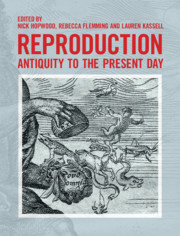Book contents
- Reproduction
- Frontispiece
- Reproduction
- Copyright page
- Dedication
- Contents
- Exhibits
- Illustrations
- Notes on the Frontispieces
- Contributors
- Acknowledgements
- Introduction
- Part I Inventing Generation
- Part II Generation Reborn and Reformed
- 9 Generation in Medieval Islamic Medicine
- 10 The Multitude in Later Medieval Thought
- 11 Managing Childbirth and Fertility in Medieval Europe
- 12 Formed Fetuses and Healthy Children in Scholastic Theology, Medicine and Law
- 13 Generation between Script and Print
- 14 Innate Heat, Radical Moisture and Generation
- 15 Pictures and Analogies in the Anatomy of Generation
- 16 Fruitful Bodies and Astrological Medicine
- 17 Family Resemblance in the Old Regime
- 18 The Emergence of Population
- 19 Generation in the Ottoman World
- Part III Inventing Reproduction
- Part IV Modern Reproduction
- Part V Reproduction Centre Stage
- Epilogue
- Exhibits
- Select Bibliography
- Index
18 - The Emergence of Population
from Part II - Generation Reborn and Reformed
Published online by Cambridge University Press: 16 November 2018
- Reproduction
- Frontispiece
- Reproduction
- Copyright page
- Dedication
- Contents
- Exhibits
- Illustrations
- Notes on the Frontispieces
- Contributors
- Acknowledgements
- Introduction
- Part I Inventing Generation
- Part II Generation Reborn and Reformed
- 9 Generation in Medieval Islamic Medicine
- 10 The Multitude in Later Medieval Thought
- 11 Managing Childbirth and Fertility in Medieval Europe
- 12 Formed Fetuses and Healthy Children in Scholastic Theology, Medicine and Law
- 13 Generation between Script and Print
- 14 Innate Heat, Radical Moisture and Generation
- 15 Pictures and Analogies in the Anatomy of Generation
- 16 Fruitful Bodies and Astrological Medicine
- 17 Family Resemblance in the Old Regime
- 18 The Emergence of Population
- 19 Generation in the Ottoman World
- Part III Inventing Reproduction
- Part IV Modern Reproduction
- Part V Reproduction Centre Stage
- Epilogue
- Exhibits
- Select Bibliography
- Index
Summary
- Type
- Chapter
- Information
- ReproductionAntiquity to the Present Day, pp. 253 - 266Publisher: Cambridge University PressPrint publication year: 2018
- 5
- Cited by



